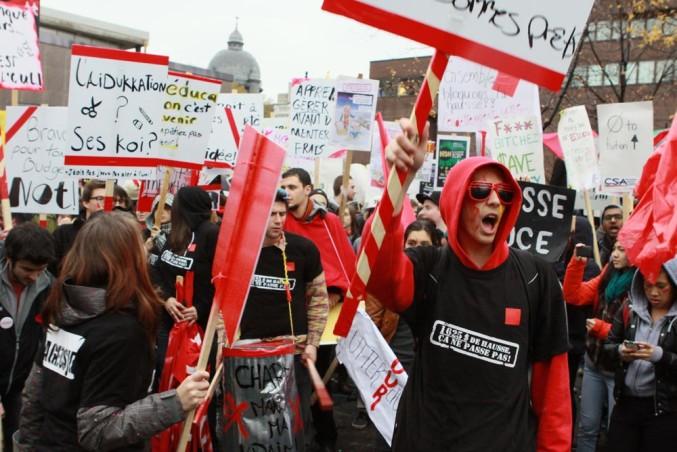By Sean Tepper
Associate News Editor
Tens of thousands of university and college students across Quebec have abandoned their classrooms in an attempt to pressure their government over planned tuition hikes.
Although most of Quebec’s francophone post-secondary institutes have been on strike since February, March 6 saw Quebec’s first anglophone university take part in the strike. Concordia University voted in favour of boycotting classes as of next week.
Other English institutes such as McGill University and Dawson College are expected to vote on the matter later in the week. As it stands, the proposed tuition hikes would see the costs of universities in Quebec increase by $325 per year to a total of $3,793 in 2016- 17; a 75 per cent increase from the $2,168 that students paid in 2011- 12.
These plans were originally announced by Quebec Finance Minister Raymond Bachand in his 2010 budget, as part of the provincial government’s plan to increase the total funding received by universities to $850 million within the next five years.
According to Statistics Canada, Canadian tuition fees have gone up by more than $600 since 2007, with the 2011-12 average expected to rise to $5,366. Amongst Canada’s 10 provinces, Quebec had the lowest average tuition fees in 2010-11 with the average student paying $2,411 per year, while students in Ontario topped the list as they paid an average of $6,640 per year.
Students are arguing that increasing tuition rates will not only discourage people from attending university, but will also increase student debt and further limit their already tight budgets.
“I think it’s a good way for students to show [the government] that they are serious,” said Marco Bertoldi, a second-year engineering student at Concordia University in Montreal. “As a student who lives on his own, $400 makes a huge difference for someone who makes around $10,000 a year. That’s one month’s rent, two months of groceries or that could pay for three classes worth of books.”
While Ontario universities have not yet gotten to the point of declaring a student strike, they have been active in protesting against the province’s tuition fees. Melissa Palermo, Ryerson Students’ Union’s VP education, led nearly 200 Ryerson students on the Feb. 1 nationwide drop fees campaign and is encouraged by what she is seeing from Quebec students.
“It’s really empowering to see students coming together and really calling on their government for what they deserve, and that’s affordable high-quality education,” she said.
Although Palermo believes that it should be up to the government to publicly fund high-quality postsecondary institutions, Ryerson President Sheldon Levy does not see that being a realistic possibility with tuition costs going up five per cent per year and the $16-billion government deficit unlikely to cover it.
“You’re always balancing the ability to provide the quality of the education with the cost of doing [so],” said Levy. “You are in some ways forced to be able to make the argument that fees have to increase and then you make the case that you will provide the additional support for those students that can’t afford it.”
Levy said that he will be taking a proposal to the board of governors that would aim at increasing tuition fees, but that the university will make sure to have enough funds for students in financial needs. Steve Lada, a second-year business management student, understands why tuition fees continue to increase, but is not happy about it.
“The student tuition fees are pretty high, but we’re getting good stuff out of it,” he said. “[The five per cent increases] make sense with all the construction being done, but that doesn’t mean I want to pay it.”













Leave a Reply